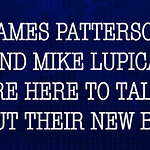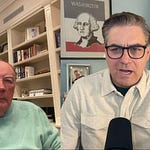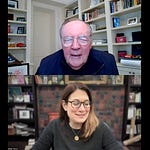B: I want to say, anyone who gets two holes-in-one in three days…
J: Yeah, that’s crazy.
B: I mean, that's, I've never had one.
J: Well, that's my wife's least favorite story. No, she hates it. She says, please don't tell that story again. Just quickly for the couple people out there who haven't heard it. This is five, six years ago, whatever it was. And at that point, my wife had four holes-in-one, and I had three. She's very competitive, she’s a big swimmer. And on February 6th, I had another hole-in-one, and she's very competitive. And she said, well, I don't like it, but I can live with it. And two days later, or not the next day, but the day after that, we're out together, and I get another hole-in-one with Sue with me, and we're standing on the tee and does she give me a big hug? No. Does she say great shot, honey? No. She looks at me and very appropriately and says, you've got to be shitting me. Which is an absolutely appropriate reaction.
J: Now I get disappointed if I don't get one! So anyway, I don't want to get too far down this particular rabbit hole and we won't, but currently, we're experiencing this disappointing, somewhat frightening, disturbing, chaotic, dizzying, tragic, comic moment in our history. And I was just wondering, have you seen anything, or remember anything even remotely like this in our lifetimes?
B: No, I think this is unique. Not only is it unique, but it's much, much worse than the way it's being covered. I think people in my business are just, you know, Trump did this. This is the criticism. It's coming out plain vanilla, and it's not a plain moment at all, in my view…
J: Vietnam, at least experiencing it from the viewpoint of a college kid, etc., that was, that was a crazy period for me, but not to sort of the degree of craziness that we're running into now.
J: In the spirit of trying to get you to spill your guts. How do you get people to spill their guts? How does that work? Ask them about their holes-in-one, that’s a good start.
B: Yeah, of course, ha! But it's all research. If you're interviewing somebody and they've written an obscure article for some intellectual magazine, actually get it and read it. And if it's relevant, quote from it in asking a question. I think the person will think, gee, I thought only my mother read that article. So, you bring yourself closer to the subject you're interviewing.
J: Now, that's a great tip. It's painful to have to do that much research. But also, I'm going to have to go back then and start over. I'll call you in a couple of weeks.
J: I think I've read most of your books, though - not all - but most of them. This is a little embarrassing, and it's almost plagiarism, because I've seen it so many times. But you've been called the best reporter, the best American reporter, the best reporter of all time, and all that stuff. Who are some of the reporters now or in your past that you admire, like that, that you think are really, really good ones.
B: Well, Sy (Seymour) Hersh, when he worked for The New York Times and before did the My Lai massacre story, which was, really a pivot point, at that point, I think for the country's understanding of the nightmare of Vietnam…
J: You know, that's an interesting thing to me about reading nonfiction, especially. And I think sometimes we're taught in school we're supposed to memorize this information, dates and names and whatever. But to me, what I want, if I read a book, I want to understand… and that's a word you just used, but that's what I want. I want to understand something I didn't understand before.
B: Well, you want to go where you haven't been before, and that's really central. I love in your memoir, one of the many things you said that it is so important is outline. And outlining, of course, is planning, and you've got to plan if you're doing an interview. And one of the things because I record with the permission of the person interviewed, and so I go back and read the transcripts and realize I talk too much.
J: No, I’m not agreeing with you, I’m just nodding, ha.
B: It's key to listen. And I have this little kind of habit of taking this finger and, you know, sticking it in my fingernails so it hurts is a memory aid to tell me to shut up. In other words, listen! I read these transcripts, and my assistant, Claire, will look at you and say you know…you're talking too much. Shut up. And one of the great lessons from the CIA is to let the silence suck out the truth. There's nothing more potent than silence.
J: Yeah, I just did an interview with the woman who wrote Gone Girl. And…I talked too much. I talked too much. I didn't let her talk as much as she should. Gillian Flynn, very interesting…wonderful fiction writer. Going back, if you can remember this far, and sometimes I have trouble thinking back, you're in the Navy for five years after college. How did that affect you in terms of moving you forward or whatever you needed at that point in your life?
B: I felt because this was while Vietnam was escalating in the late 60s, and I didn't like the Vietnam War at all, and I felt that I was captured, that I had no freedom. And so when I got out of the Navy after five years, it was so liberating, and I walked into The Washington Post and said, I'd like to work here. They gave me a two week tryout, which I failed.
J: Tell me about that, a little bit, failing…sometimes these things they're very painful, but over time they become a little bit more humorous.
B: Well, I never looked at it as humorous, but it was. It was a lesson because I was lucky. I walked into The Washington Post. They gave me a two week tryout, and I realized I didn't know how to do the reporting, but I realized that I loved it. This is what I want to do, and so that you know you're on a path. Did you always want to be a writer? Did you, you know you have your stint with J Walter Thompson, right?
J: Yes, I always wanted to be a writer. I just didn't feel, I didn't have the confidence to feel that I could do it. So I said, I better get a day job and, you know, and we'll do that. And yeah, I still don't have the confidence. I don't know why I have the confidence to think I can do it at this point. So, how much time passed after that first two weeks didn't work? So you kept going at them, and they eventually hired you for a while…
B: Well, they said you need to learn how to do journalism, because I didn't…I worked on my college newspaper… and the editor who was interviewing me before the two week tryout said, what's attribution? And I literally did not know what attribution was (in other words, according to the mayor or something, according to an expert, or according to the book) and he just flat out said, you do not know what you're doing, and I said thank you. And he said, why are you thanking me? And I said, because I know this is what I want to do, and I agree I need to learn. And I went to a weekly paper for a year and had some stories that The Washington Post wished they'd had. So finally, they hired me after that.
J: And how long had you been with The Washington Post when you and Bernstein were handed the Watergate story?
B: Really, nine months - I was covering night police and got a call after the Watergate burglary, where they arrested the five burglars. They sent me on a Saturday morning to the courthouse to watch them being arraigned. So, for nine months, I'd seen all kinds of burglars, but never a burglar like this, because they all had business suits. In fact, I've never seen a burglar that was well-dressed. And so I'm listening to this. And the the lead burglar, James McCord, the judge asked him where he worked, and McCord went CIA (whispering) and the judge said, speak up. And then he said, CIA. And I was sitting in the second row.
J: Oh, my God. Okay. I don't know why this all strikes me as funny, but you know, you got to laugh. Sometimes this stuff is really crazy. I have to laugh a little bit. Sorry.
B: Yes, exactly. But being seen witnessing that and just saying, no, wait a minute, this is not your average burglar… and these five men and lead burglar worked for the CIA. I mean, come on. I mean, it was like it was being stamped on my brain. This is an important story.
J: Was Bernstein involved early on, or did that happen a little later?
B: So that first day, about six of us worked on the main story, including Carl Bernstein and myself. The next day was Sunday. Two people came in, Carl and myself, realizing that this, wow, okay, got an odor about it, and then we did our first story together that Sunday that was in Monday's paper that said the lead burglar was head of security at the CIA and the Nixon reelection committee.
J: And that was that front page? That story?
B: Yes, it was the front page, and it was a mystery. And in the first story, where six of us worked, we asked the potent question, where it couldn't that not be learned who was behind this, if anyone who sponsored this, and what was the purpose of the this burglary, and in many ways, the next two years to Nixon's resignation, was answering that question, those two questions, who was by Nixon, what was to destroy the Democrats and make sure he was re elected?
J: Now somewhere in here, just to switch lanes - which I love to do - you fell in love with the wonderful Elsa, and much later, I guess Phil Donahue hooked you into contributing to a book he did with his daughter, What Makes a Marriage Last. So, what makes a marriage last?
B: Trust. And again, listening…and realizing my imperfections and lapses. And she's very gentle, but she gets to the point when you know, why are you doing this? And she's smarter than I am, much more. She reads everything, all the time…and so it's a PhD in life.
J: I have a book coming out, which I think is useful, because I think a lot of young guys are kind of lost in space and overwhelmed and the notion is how to be a better dad in one hour. And my notion is that these guys will not read a 400 page book, but they will maybe spend an hour. And my promise is that in that hour, you will pick up some things that will make you a better father. And that's really a hell of an hour to spend. But one of the key things you mentioned is trust. And one of the first things is consistency. And consistency, especially with your kids, gives you trust. It's like a referee in a ball game…if they're consistent, we know how we can play this game if they're not consistent, it's very confusing.
B: Yeah, may I just, I think inconsistency is important to teach kids and to teach them that, yeah, the world is inconsistent. Yes, it is, and you're going to be surprised. And so I wouldn't pedal consistency. I would pedal inconsistently.
J: I don't know about parents being inconsistent, so I will agree to disagree on that one. I totally agree with you about setting…when Jack was 10 or 11 or whatever, I told him, at a certain point, probably when you're 18 or 19, you're going to realize that none of this makes any freaking sense. But let me tell you right now, none of it makes any sense, so that when you're 18 or 19, when it happens…it's not going to surprise you and drive you a little crazy, and whatever. And so I always was big on, on, you know, the world is, it is what it is and it is inconsistent, and it is, well, just where we started, which is, it's never been more inconsistent than it is right now.
B: Yes, I mean, that's one. I mean we are going through, as I was trying to say, a fracture in history. And I think I would really need to pay attention to it, because I got to know Trump very well. I did three books on him and the biggest problem with Trump is he does not examine, naturally, the consequences of what he’s doing. And consequence management is really important, particularly a leader, a political figure, and he doesn't care about the consequences.
J: Yeah. I mean the first thing is obviously spotting problems, and he does it. A lot of us do that. The next thing is, what are the possible things we can do? And then, as we're discussing, you know, and then, okay, what's the consequence of that? Okay, we're going to want to cut down the government a bit, and that's probably a good thing, but where are you going to do it and what are the consequences? And these people that want it to happen, until all of a sudden, Uncle Jacob gets fired, and they go…wait a minute. Well, don't you think, if you're going to cut money out, that people are going to get fired, you know? But, they don't think about the consequences. That's absolutely right,
B: And it's the consequences that are really important. And you need a method, and you need to have some sort of layout, a plan. Now, in my interviews with Trump in 2020, the last year of his first presidency, I mean, he just has no plan. And that summer, it was the year of COVID and and I found he had all these warnings about COVID coming. It's going to kill 650,000 people, and he ignored it. And the interviews, which are all recorded with his permission. You see somebody getting the information. I mean, he could have been a hero and come out and said look, I got these warnings about this virus coming. It's going to kill, let's develop a plan. And he wouldn't plan. He somehow got this idea that somehow it was better to conceal it rather than level with people.
J: And the vaccine was developed pretty quickly. I mean, in terms of the way governments run, and that was another thing. I mean, he could have taken credit for that, and I'm surprised he didn't.
B: No he has, and rightly so. But the problem was, in the summer, 140,000 people had died of it, and I did my last interview with him. I think it was July 20th, and you know, what's the plan? What? And literally, he said, don't worry, I'm going to have a plan in 103 days. I only realized 103 days was Election Day.
J: That's some plan. You spent a lot of time with him. I mean, it's surprising to me that after the first book or whatever, he would say, well, let's do another one. But pros and cons. What? What's not talked about? What don't people understand about him?
B: Well, you've got to understand the power of his personality, and you've got to understand and you know, lot of people don't like to hear this, but he can be very charming and very outgoing, and that year of interviews when I told him that the book is coming out and he wasn't going to like it and he said why am I not going to like it? I said, well, I make some judgments that are very tough. And he said, what are those? And I said, well, I'll send you a copy of the book when it's done, but they're very severe. And he literally said, oh, maybe I'll get you on the next book. Strike one.
J: Did you send him the book before it came out?
B: No, just as it was coming out.
J: In that same vein, Joan Didion talked about some of your work and criticized, sort of the fairness of it, which is interesting to me, especially in terms of the way you've been talking - where you go out and you try as best you can to get the facts, you try to get people to say what they're what they're all about. And I think what she was saying was that she wanted you to editorialize more - which is one of the problems I think, right now, with journalism.
B: Yes, I think so. But, you know, one of the things is, you know, when you get criticism, instead of putting up a wall…you want to learn from it. And I, quite frankly, thought she had some points and I need to learn from that and try to distill out the emotional reaction.
J: To distill it out, or to put more in?
B: No, pull your own emotional reaction out and say, well, maybe that's a fair point.
J: Okay, oh, you mean in terms of her point-of-view, okay.
J: Yeah, obviously you've interviewed everybody. I mean, just sort of little portrait stuff. Nixon, who was this guy?
B: Yeah, Nixon, unfortunately, was obsessed with winning, and he worried he was not going to be reelected, so he set up an operation to try to destroy the Democrats. And he got caught. And he taped all of his conspiratorial…and the tapes at one point in my life, I had them on cassettes, and I would play them in the car instead of music, because they're so revealing about him. He was so concerned with concealing who he was and what he was doing - to secretly tape it?
J: Well, I mean, obviously, you know, President Trump is, is obsessed with winning, obsessed with it. You know on the golf thing. I mean, I've seen some of the stuff he does and go, this is really strange behavior, because the guy is, is actually a very good golfer, and so why do you cheat? I don't get it. It's like, you can see it. But he's actually good. I mean, I have played with some people. They're terrible, and they cheat you and you go, okay, fine, ha. You kicked it out of the woods. He actually is (good). It's very strange behavior.
J: Did you ever do anything with Clinton?
B: Oh, yes, I did books. He didn't like the first one, The Agenda. And it showed the chaos in the Clinton White House, and how unorganized and frankly, just to be very straight about it, I go back and I've looked at that book, and he did a pretty good job as president on two things. We had a stable economy and there was no war. And gee, that'd be nice to have now. No war. And a stable economy.
J: Yeah, that'd be good. A role model would be good too. You know, I think he's one of those people who he sees all sides of things, and sometimes people like that have trouble making decisions, and I think that's a little bit of a problem, at least in the first term, in terms of that ability to make decisions.
B: Yes, I think that's correct. But, you know, it's Clinton. Clinton is unique. And the astonishing thing about him is he came on the scene, was unknown and beat the sitting president. I mean that was amazing. And he orchestrated and he knew how to apply his personality.
J: Well, we seem to always be looking for change every election cycle. And if somebody comes in and they're looking for change, and they found him. You know, he's very smart, he's very articulate, he's great on camera…
J: Which brings me to the notion of, do you see any viable Democratic candidates out there now?













Share this post